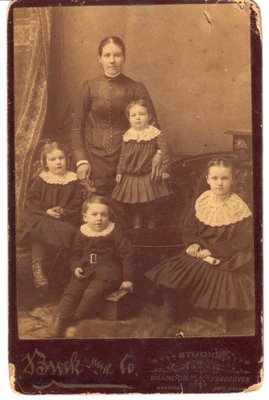
OK... This will seem a little random to people but as a genealogy researcher I found it interesting enough to share...
Over the past few years I've been intensely researching my family's roots and branches (that's my great great grandmother and her kids, left). There more and more sites that help one accomplish for example
FamilySearch.org (brought to you by those busy Mormons who collect church members for their pews long after they've shuffled off this mortal coil) and
RootsWeb (a free service that permits members to share lineage databases and info). All of
this has in fact become big business as the
Wall Street Journal reported in July of this year. But the business aspects I leave for another day. What about those old, lost souls?
Well if there is one thing that became apparent to me in my searching is that people are wont to see their own histories, no matter how pedantic and dull, as anything ... so long as it's positive and uplifting. Gleaned from the annals of collected lore and in many cases written texts (both professional and familial) they bristle with words like "achieved", "overcame", "survived", "settled", "founded", "built" and more superlatives for growth and augmentation then one can shake a stick at. But where though is the tragedy in those lives then? Why bury it with their best clothes in a box in the ground?
The software programs that help people collect the information on one's relatives, like
Family Tree Maker, contain all the usual "slots" for personal particulars, like birth, marriage, and death, and then other "milestone" headings like "christening/baptism/Bar Mitzvah, Bat Mitzvah", "military", "political" etc. True, you can enter any other title in this field area as a label but it sure doesn't come with... "Criminality", "Faithfulness" or "Lunatic". This might sound stupid but the fact of the matter is, is that our families
are made up of
all these things.
A couple of "cases in point"...

One of our relatives "went missing" in the censuses and we eventually found her living with, oh, some 60 other people. Scanning to the top of the census page we see it was a large building - the
asylum in London, ON (see picture). Now one wouldn't go looking for one's relatives in the loony bin though would one? And then there's my great-great grandfather who recently showed up in a
Library and Archives Canada search as being convicted and held at
Kingston Penitentiary in 1847 - hell it had only been open for a few years and he'd already found a room?
But what's missing here is
why either of these relatives were in these places. Were they crazy? Murderers? Don't we disservice their past by ignoring these things by pretending they don't matter? It seems to me that we want to sanitize our lives - a micro version of what we do to all but the largest and most heinous events in "world history" perhaps. No husband in our genealogies ever hit a wife. No great aunt never raised a bottle too often until it put her in a grave. All of their business and land transactions were scrupulous and for the greater good - never selfish or self-serving. What a crock. What in fact might be important too is to recognize, in the case of my great aunt for instance, is that she may
not have been crazy but "put away" because she was "old" - not crazy, but just old. Seeing history as a fabrication and not just what it seems to be is important as well then.
Our romanticized view of our pasts has cauterized our ability to see our families as entities, warts and all. Instead of reveling in the sometimes questionable, but more often than not forgiven, or at least empathized-with, sadder sides of them we are missing out on our own strengths. The strength to be compassionate, to help, to hold up when all
is lost. Sometimes the bleakest moments of lives tell the most about the mettle of those living them. Not the awards and accolades. And certainly not the Disneyified pasts many of us have created as foundations for our own greatness.

My family (this is my great, great, great grandfather in Manitoba, c. 1880-1890, his first house there), I've learned, were mostly farmers. And then some farmers. And for good measure... more f-ing farmers. I was shocked at the banality of it. In some 3000 relatives over 300 years almost 90% were farmers, 5% were preachers of some sort and the rest a mixed bag (counting males because of course what women did wasn't important - ugh!). The closest to greatness we came was 2 mayors of two dinky towns. But so what? I
like the fact (now I've digested it) that we were, well, "just people". These people lived, loved, cried, fought, hated, killed (probably at least a few), despaired, hoped, you name - the whole spectrum of human lived emotion made up complete lives - not patch-worked database lives. We need to remember them for
all that they were and hope when we shuffle off that some one will pay us that same honor.





